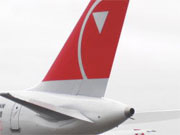Audio
Photos
| ||||||||||||||||||||||
St. Paul, Minn. — Northwest unions find little to like in the airline's plan to cut labor costs; they face lower wages, fewer vacation days, more costly health care, and frozen pension plans. But union leaders say the biggest threats to derail talks are two newly minted names: NewCo and GroundCo.
Both would be separate companies created -- and owned, at least to start with -- by Northwest. NewCo would fly jets with 70 to 100 seats. Northwest operates very few of these right now, but sees them as the most efficient way to serve many American cities. GroundCo would take over bag handling and customer service jobs at non-hub airports. Both subsidiaries would be staffed at least in part by former Northwest employees, working for lower wages than their colleagues at Northwest itself.
To supporters of the plan, NewCo and GroundCo comprise a bold move to transform Northwest from a financial relic into a reliable money-maker. Airline industry consultant Mike Boyd says the subsidiaries could make Northwest "obscenely competitive" -- and he means that in a good way.
"You want to be the best you can be, and I think the management at Northwest has decided, 'No more games, no more temporary stuff, no more halfway excuses -- we're going to fix it and fix it now,'" Boyd says. "If they do, everybody will benefit. Yes, you won't have as many people making $50,000 or $60,000 (a year) loading luggage. But guess what? That job today can't support those wages."
Northwest declined an interview on its subsidiary plans.
Unions for pilots, flight attendants, and groundworkers say NewCo and GroundCo are overkill. In filings with Northwest's bankruptcy court, the unions say Northwest's proposal goes well beyond what the company needs to become competitive.
A filing by groundworkers calls GroundCo an attempt not just to cut costs, but to "destroy" the union at Northwest. The union says GroundCo, along with outsourcing, will eliminate almost half its members' jobs at the airline.
The pilots' union says NewCo could eliminate 20 percent of current pilots' jobs, as Northwest moves from its older DC9s to the sleek new jets flown by the low-cost subsidiary. Northwest Air Line Pilots Association chairman Mark McClain says its too much to take for pilots, who have already cut their salaries by more than a third.
"It is a slap in the face when you've been responsive and responsible," McClain says. "We have led the way in concessions, but that doesn't mean we're an easy target. We'll do what's necessary, but we don't plan on doing any more than that. Northwest management seems to think that they do need more, and we're not willing to go there."
To sweeten the deal, Northwest says laid-off Northwest pilots can have first dibs on NewCo jobs. They could still be represented by the union, though their contract would be entirely separate from mainline Northwest pilots.
In 2002 then-bankrupt US Airways made a similar "jets-for-jobs" deal, giving furloughed pilots jobs on the newly-created MidAtlantic Airways. MidAtlantic has since been dissolved, and its assets sold to an unrelated airline company. Northwest pilots say the future of NewCo would be similarly uncertain.
The union has an alternative it calls "N Star." N Star would be a division within Northwest, not a separate company. It would fly those smaller jets, and its pilots would make less. But they could also rise through the ranks to fly bigger planes for more money, and all pilots would share the same contract. The flight attendants union is also backing the N Star idea, saying there is no indication its members would have any preference at NewCo.
If the unions lose on NewCo and GroundCo, it would be a major moment for the industry, according to Dawna Rhoades, an expert in airline strategy at Embry-Riddle Aeronautical University. Rhoades says what is remarkable about Northwest's subsidiary proposals is not that no one has ever thought of them. It is that no carrier has ever really been in a position to push through such a major overhaul.
"Almost all of these ideas have been floated before, have been suggested by airlines," Rhoades says. "Unions have tended to resist essentially all of them, and in other times have been relatively successful at doing that."
All three unions have warned NewCo and GroundCo could cut so deeply as to be worth striking over -- a situation that might mortally cripple the airline. Negotiations in the coming weeks could decide whether Northwest emerges from bankruptcy with the two new companies it wants -- or no company at all.






